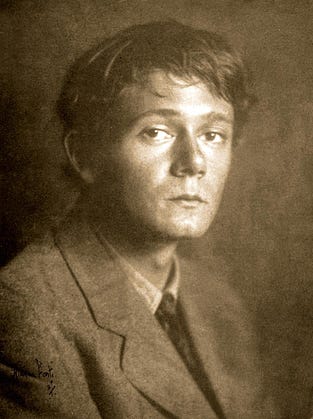Good morning, Macabre Monday crew! Though I do not have an article or poem for this week, I would like to start contributing notes that highlight horror and speculative fiction authors whom I believe deserve far more respect and attention. For this note, I will briefly be discussing Clark Ashton Smith.
Clark Ashton Smith was a prolific poet, with the fantasy/horror fiction he would later write sharing the lyrical and colorful language he lavishly infused into his poems. Writing with a painter’s eye, Smith conjured up worlds and tales that are both alien and mythologically complex, capable of being mysterious, unsettling, beautiful, morbid, and absurd. A particular quote from Smith’s tale The Double Shadow contains a notable example of Smith’s mastery of the English language:
“Not without terror (since man is but mortal) did I, the neophyte, behold at first the abhorrent and tremendous faces of them that obeyed Avyctes: the genii of the sea and earth, of the stars and the heavens, who passed to and fro in his marmorean halls. I shuddered at the black writhing of submundane things from the many-volumed smoke of the braziers; I cried in horror at the grey foulnesses, colossal, without form, that crowded malignly about the drawn circle of seven colors, threatening unspeakable trespass on us that stood at the center. Not without revulsion did I drink wine that was poured by cadavers, and eat bread that was purveyed by phantoms. But use and custom dulled the strangeness, destroyed the fear; and in time I believed implicitly that Avyctes was the lord of all incantations and exorcisms, with infallible power to dismiss the beings he evoked.”
Smith and Lovecraft would frequently collaborate and reference callbacks to each others literature, though unlike the nihilistic dread that permeates the literature of Lovecraft, Smith evokes a sardonic sense of humor akin to a friend playfully nudging you in the ribs, expecting you to be in on the joke, whilst he secretly expects your naïveté of what’s to follow suit. A fan of the pastiche and the preposterous, Smith has no qualms with writing batsh*t insane stories, without them being foolish, childish, or patronizing. I can easily imagine Smith banging away at his typewriter, wryly smiling and chuckling as he watches his latest yarn unfold.
Though many of Smith’s works do contain humor, he is also able to evoke a sense of tragedy, of something long lost or dissolving into something unrecognizable, falling outside of man’s control. Smith’s fiction is, by far, more emotionally complex than Lovecraft’s, lightly tinged with pathos and the corporeal, making him a more approachable choice for those who are interested in reading old-school pulp fiction.
Several books containing Smith’s fiction and poetry exist, though I have yet to locate one that anthologizes his complete oeuvre, however, there is thankfully an archive of the Eldritch Dark website, which is dedicated specifically to making all of Smith’s fiction free and easily accessible. I highly recommend visiting and bookmarking this hidden gem. A link for the site can be found here:
To conclude this post, I shall share a quote from the fruitful speculative fiction author L. Sprague de Camp on his feelings for Smith’s literature:
"Nobody since Poe has so loved a well-rotted corpse."
Truer words hath never been spoken.
Rest in Peace, Clark Ashton Smith
January 13th, 1893 – August 14th, 1961
Recommended Reading:
The Double Shadow
Ubbo-Sathla
The Door to Saturn
The Dark Eidolon
Xeethra
The Flower Women
The Vaults of Yoh-Vombis
MM Staff:
MM Writers:

